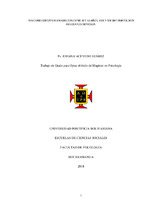Funciones ejecutivas en adultos entre 50 y 66 años, con y sin sintomatología ansiosa y/o depresiva

View/
Date
2019Author
Acevedo Suárez, Johana
xmlui.dri2xhtml.METS-1.0.item-advisor
Director. Bothelo De Oliveira, Silvia
xmlui.dri2xhtml.METS-1.0.item-type
Maestría
Citación
Metadata
Show full item recordDocuments PDF
Abstract
Las funciones ejecutivas son necesarias para coordinar y regular procesos cognitivos y emocionales. Considerando que los trastornos de ansiedad y la depresión son trastornos emocionales prevalentes que generan malestar y conductas desadaptativas asociadas a alteraciones en los procesos fisiológicos, comportamentales y cognitivos en población adulta, el objetivo del presente estudio fue analizar la relación diferencial entre el desempeño en los componentes de las funciones ejecutivas en adultos entre 50 y 66 años sin deterioro cognitivo con sintomatología ansiosa y/o depresiva. La metodología implementada fue de enfoque cuantitativo, con un diseño no experimental, de tipo transversal correlacional, permitiendo hacer inferencias sobre las relaciones entre las variables en un momento determinado. Utilizando un muestreo no probabilístico a conveniencia la muestra fue conformada por 13 hombres y 38 mujeres habitantes del área metropolitana de Bucaramanga. Se aplicaron los instrumentos: escala de ansiedad de Zung e inventario de ansiedad de rasgo-estado (IDARE) y Escala de Depresión del Centro de Estudios Epidemiológicos (CES-D) e Inventario de depresión Estado-Rasgo (IDER). Además, se utilizó la batería neuropsicológica de las funciones ejecutiva y lóbulos prefrontales (BANFE-2). Los mejores desempeños en los componentes de las funciones ejecutivas (detección de riesgo-beneficio, seguimiento de reglas) se obtuvieron en presencia de síntomas ansiosos. Al contrario, en presencia de sintomatología depresiva se encontraron bajos desempeños en tareas relacionadas a los componentes de las funciones ejecutivas asociados a las áreas orbitofrontal y dorsolateral (actitud abstracta, comprensión del sentido figurado y metamemoria). En ambos casos, se evidenció un enlentecimiento en el procesamiento de la información asociado a mayor tiempo de ejecución en las tareas. En conclusión, el desempeño en los componentes de las funciones ejecutivas de los participantes varió dependiendo de la presencia o ausencia de sintomatología ansiosa y/o depresiva, siendo la depresión la condición emocional que produjo mayor compromiso de las funciones ejecutivas. Executive functions are necessary to coordinate and regulate cognitive and emotional processes. Considering that anxiety and depression disorders are prevalent emotional disorders that generate discomfort and maladaptive behaviors associated with alterations in physiological, behavioral and cognitive processes in the adult population, the objective of this study was to analyze the differential relationship between performance in the components of executive functions in adults between 50 and 66 years without cognitive impairment with anxious and / or depressive symptomatology. The methodology implemented was a quantitative approach, with a non-experimental design, of a cross-correlation type, which allows making inferences about the relationships between the variables at a given moment. Using a non-probabilistic sampling to the convenience of the sample consisting of 13 men and 38 women from the metropolitan area of Bucaramanga. The instruments were applied: Zung Anxiety Scale and Condition-Trait Anxiety Inventory (IDARE) and Depression Scale of the Epidemiological Studies Center (CES-D) and the Condition Depression and Trait Inventory (IDER). In addition, the neuropsychological battery of executive functions and prefrontal lobes (BANFE-2) was used. The best results in the components of the executive functions (risk-benefit detection, follow-up of the rules) were obtained in the presence of anxiety symptoms. On the contrary, in the presence of depressive symptomatology, performance was found in tasks related to the components of the executive functions associated with the orbitofrontal and dorsolateral areas (abstract attitude, understanding of the figurative sense and metamemory). In both cases, there was a deceleration in the processing of the information associated with a longer execution time in the tasks. In conclusion, the performance in the components of the executive functions of the participants varied depending on the presence or absence of anxious and / or depressive symptoms, with depression being the emotional condition that produced the greatest commitment of the executive functions.
Collections
- Trabajos de grado [6440]
The following license files are associated with this item:

